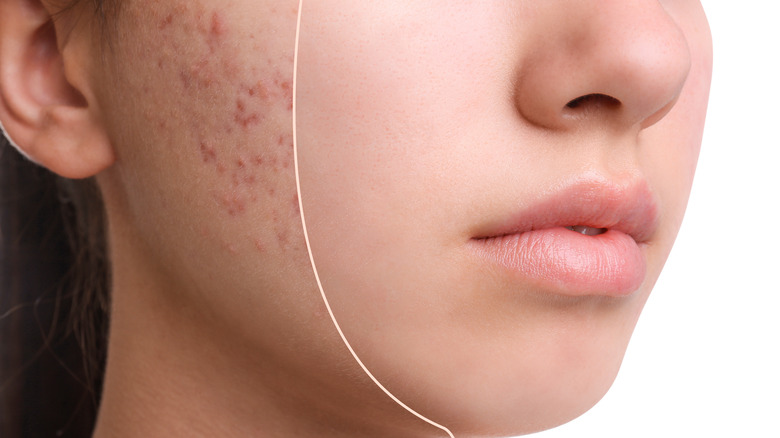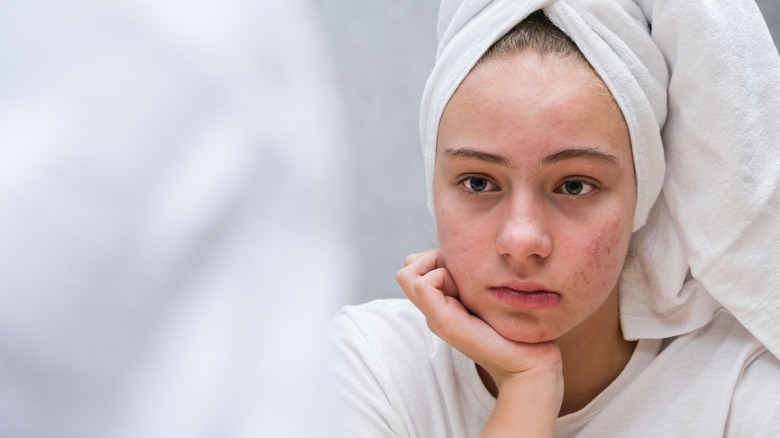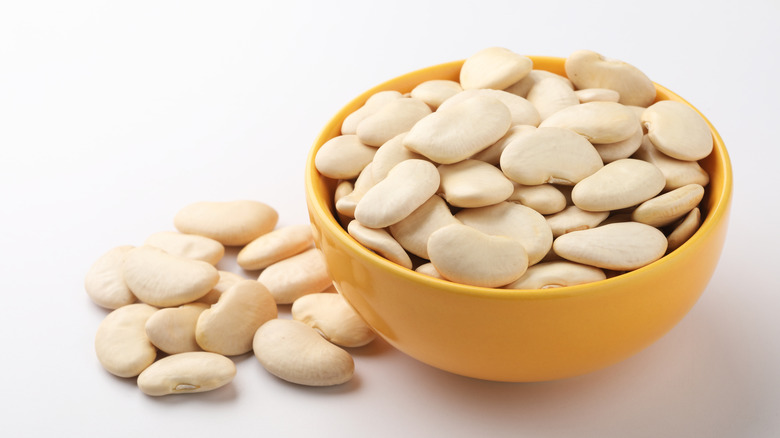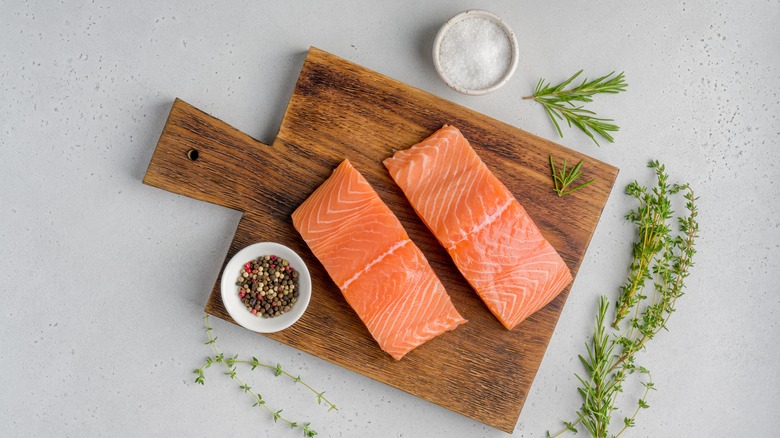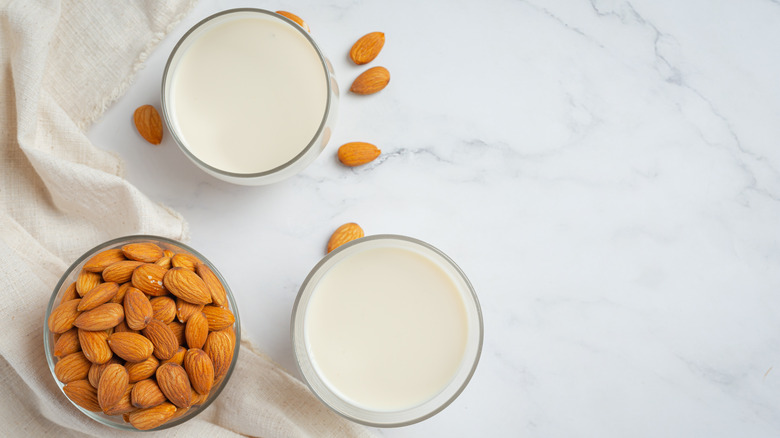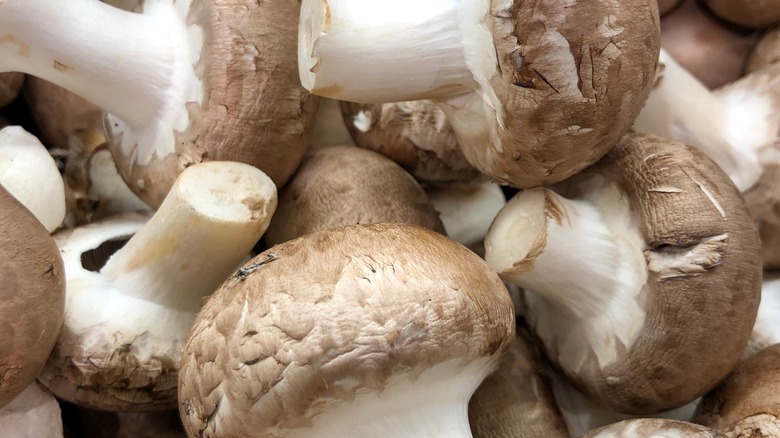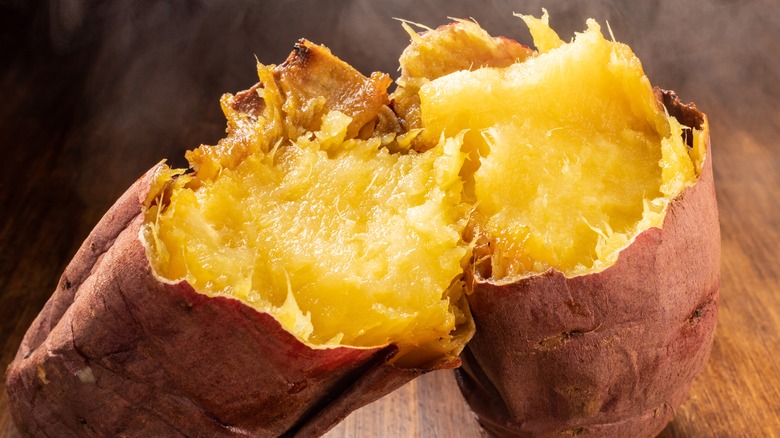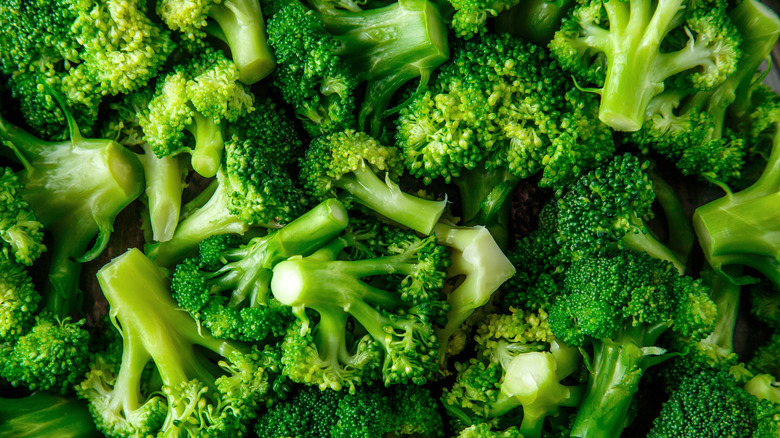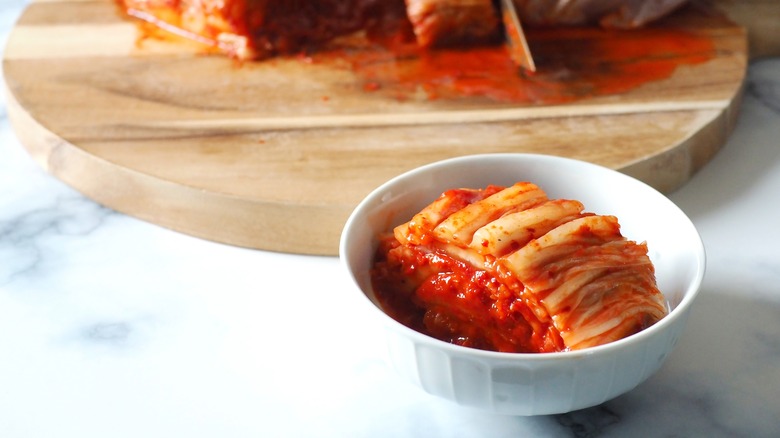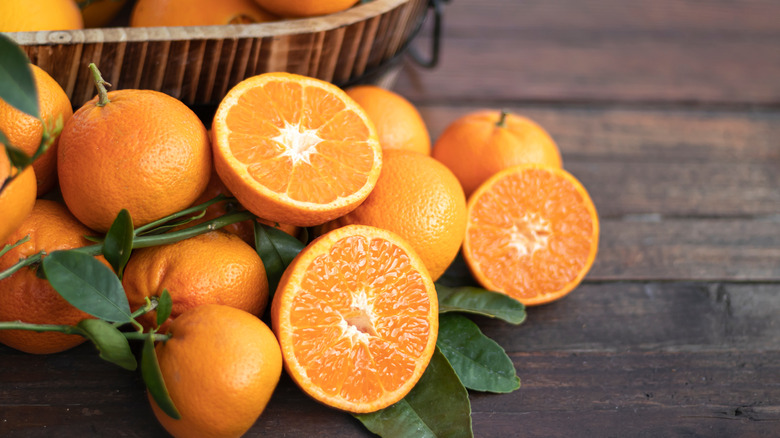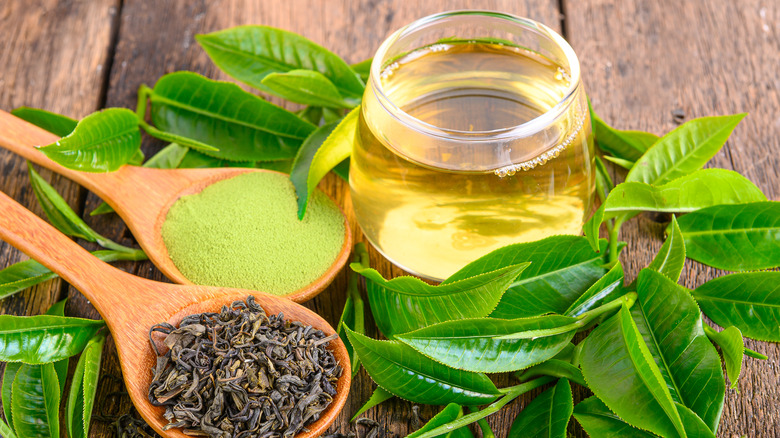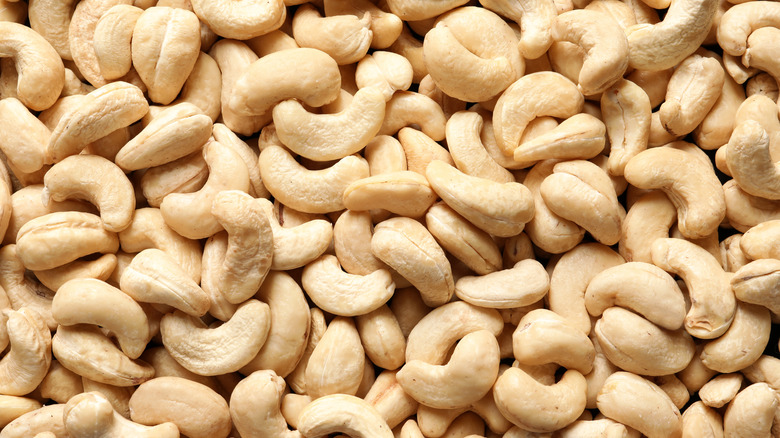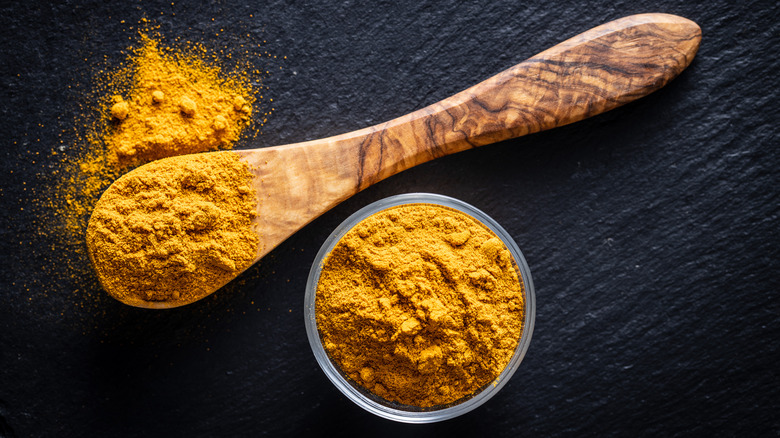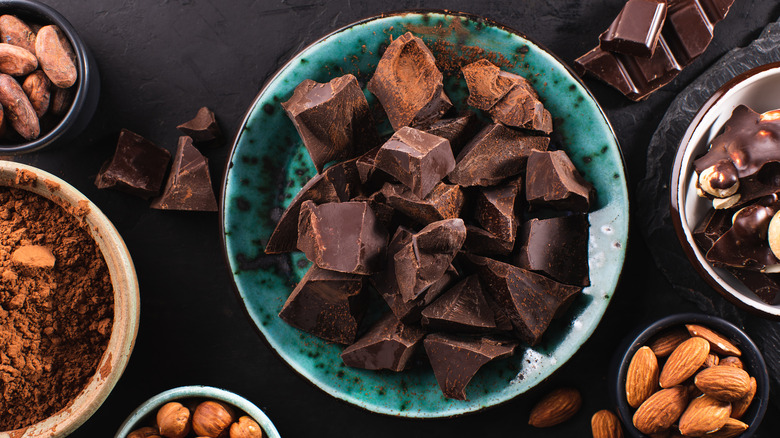12 Best Foods To Eat To Get Rid Of And Prevent Hormonal Acne
There are few things in life as persistent as acne. The skin condition is experienced by countless people around the world every year, with almost seven out of eight people having a bout of acne between 12 and 24 years old, and a frankly wild amount of dollars spent on acne treatment every year in the United States (per the American Academy of Dermatology Association). And of all the types of acne you can experience, hormonal acne can be one of the hardest to treat. Hormonal acne (which, as you might expect, is acne that is prompted by your hormones — we love a health condition that just tells you how it is), while commonly thought to only happen when you're a teenager, can happen at any stage in your life, with hormonal fluctuations as you age potentially prompting further bouts (per Healthline).
But while it's all too easy to throw our money at flashy acne treatments that promise the world, a large factor in keeping the skin condition managed is what we eat. Certain foods out there have the potential to set our skin back — but the good news is that other foods can be seriously beneficial for hormonal acne. And we've got them all right here.
Why do we get hormonal acne in the first place?
Hormonal acne is pretty much what it says on the tin, folks. As you go through life, your hormone levels change, particularly when you're going through periods of bodily adaptation like puberty, pregnancy, menopause, or having treatment with testosterone (per the Cleveland Clinic). When this happens, our skin can start to create more oil, which can then mingle with bacteria on our skin and clog our pores up. These clogged pores then disrupt the texture of our skin, resulting in the itchy, painful spots that we also know as acne.
It's worth bearing in mind that, aside from diet, there are a few lifestyle factors that can affect both your likelihood of generating hormonal acne and your ability to treat it successfully. Not getting enough sleep and high levels of stress may cause fluctuations that can affect your skin health, as can certain medications you might be taking and the environment you're living in. Skincare is also, naturally, very important, and it's advisable to use skincare products that don't have oil in them, which may clog your pores further. Looking for products that are labeled "non-comedogenic" or "non-acnegenic" can be a good clue for whether or not they will be healthy for your skin.
Butter beans could help you control your acne
If you're looking for cheap and easy-to-prepare food that could keep your hormonal acne in check, there's no need to go further than your kitchen pantry. Butter beans, and other types of beans and pulses, are one of the best things that you can eat with hormonal acne, thanks to their low-glycemic-index (GI) status, with their GI score sitting well under 55 (per Medical News Today).
The lower a food's GI score is, the less drastic of an effect it will have on raising your blood sugar, which may prove seriously beneficial for acne management, as the American Academy of Dermatology Association (AAD) states. A less extreme fluctuation in blood sugar will result in two things that are useful to limit hormonal acne: less inflammation throughout the body and less sebum production. Indeed, some research has found that when people ate low-glycemic diets originally intended for weight loss purposes, they saw a drastic reduction in both incidences of acne and their need to use acne treatments.
Loading up your plate with salmon will calm hormonal acne
We sometimes wonder whether salmon know the frankly outrageous expectations we place on them as a health-giving food. But to be quite honest, it's just that good, folks. And in addition to salmon's other myriad health benefits, like helping to protect the brain and your heart health (per WebMD), it'll also prove very kind to your skin, if you have hormonal acne.
This is all down to the fish oils that are so abundant in salmon, including omega-3 fatty acids. "Omega-3 fatty acids work primarily by blocking the arachidonic acid pathway that generates inflammation," states Schweiger Dermatology Group dermatologist Jason Miller (via Everyday Health). This results in your acne flare-ups being less acute, as your skin experiences less inflammation. It could also be the case that ingesting omega-3 fatty acids regularly might assist in keeping testosterone levels stable, a key factor in preventing hormonal acne flare-ups. It's important to note, too, that even though you might assume that taking fish oil supplements will cover this, The University of Texas director of dermatologic surgery and director of laser and cosmetic dermatology S. Tyler Hollmig tells Everyday Health that eating a varied diet that includes fish like salmon is the best way to make sure your skin is as provided-for as possible.
Plant-based milk alternatives are a great choice
Have you crossed over to join the plant-based revolution yet? Is your fridge stocked with tofu, seitan, and almond milk in place of your regular animal-based products? If not, especially in the case of plant-based milk, what we've got to tell you about their benefits for hormonal acne may give you the final push.
The positives, however, are not so much in what you're choosing to drink as in what you're not choosing to drink. Cow's milk has long been associated with increased incidences of acne, and while the jury remains out on whether it's a direct cause of acne flare-ups, research has pointed toward acne being more a feature when people have a cow's milk-heavy diet (per the AAD). This could be because cow's milk is typically higher in hormones, which may result in increased acne flare-ups for people with hormonal acne. Plant-based milk, on the other hand, may have far less of an effect on the skin. Picking almond milk specifically may be a great choice for your skin health, given that it's loaded with antioxidants and vitamin E, both of which can provide benefits (per Holland & Barrett).
Mushrooms could be your best friend
Sorry, but how great are mushrooms? These fleshy, filling fungi are a natural fit in pretty much every meal you can think of, and they're also cheap, easy to find in stores, and are packed with nutrition (via WebMD). Mushrooms are especially good for people who experience hormonal acne because of their high vitamin D levels, as Healthline points out. Vitamin D deficiencies have been associated with an increased likelihood of developing acne, as a review published in Dermatoendocrinology shows, with vitamin D supplementation also proving useful in controlling acne flare-ups.
And if you want to boost the vitamin D levels in your 'shrooms even more, you can do something very simple to them: Place them in direct sunlight. The more time mushrooms spend in the sun, whether they're still growing or are picked and drying out, the more vitamin D they will absorb from that fiery ball in the sky, Fungi Perfecti shows. It's for this reason that commercial mushrooms, which are typically grown in the dark, are less abundant in vitamin D than wild mushrooms grown in natural light.
Sweet potatoes are vitamin-rich
We have so much time for sweet potatoes, it isn't even funny, people. These sweet-tasting tubers are, apart from being totally delicious, little health bombs, with your risk of cancer, heart disease, diabetes, and macular degeneration all being potentially reduced by adding sweet potatoes to your diet (per WebMD).
And for people who have hormonal acne, the sweet potato is about to get even better. Sweet potatoes are particularly abundant in beta-carotene, the compound that gives them their bright orange hue (per Healthline). When you eat beta-carotene, it's converted in your body into vitamin A. And this vitamin A is dynamite for your skin, with barrier-creating properties for your skin that will fight against inflammation and clogged pores, and therefore reduce acne flare-ups. And if sweet potatoes aren't your thing? You can get your vitamin A elsewhere, too. Beta-carotene is also present in high levels in carrots and pumpkins (as you might expect from their similarly vibrant color), as well as tomatoes, red bell peppers, and animal-based sources like eggs and beef liver (per the Harvard T.H. Chan School of Public Health).
Broccoli may be your best friend to combat hormonal acne
It's usually a pretty good idea to place broccoli on your plate. The fiber-rich cruciferous vegetable is also loaded with antioxidants and phytochemicals that can help to bolster your health in several ways, from keeping your heart ticking to protecting your vision, writes registered nutritionist Nicola Shubrook for BBC Good Food.
But what we're particularly interested in, with regard to hormonal acne, is broccoli's effect on our hormones. Cruciferous vegetables like broccoli have a notable effect on estrogen levels, thanks to a compound known as indole-3-carbinol (or I3C) which assists in metabolizing the hormone. This has many implications, but one of the most notable is the reduction of acne flare-ups caused by excess estrogen production, as well as a decrease in other risk factors created by having a hormonal imbalance. Indeed, a study published in the journal The Breast found that when people ate cruciferous vegetables regularly, they were less likely to develop breast cancer, potentially due to the effects of indole-3-carbinol on the body. And if broccoli's not your thing, there are a host of other cruciferous vegetables that you can add to your plate, from cabbage to arugula to radishes (per the National Cancer Institute).
Grab yourself a tub of kimchi
Honestly, we adore kimchi. Absolutely love it. Could eat a whole tub of it right here, right now. And mainly, we love it for its unique, funky taste, but we've gotta admit that its health benefits are also a big sell for us, especially when it comes to kimchi's effects on hormonal acne. As a probiotic, kimchi may prove to be beneficial for people experiencing hormonal acne, as a review published in the International Journal of Women's Dermatology discusses. As the review indicates, there's increasing evidence that probiotics may have some significant anti-acne effects, as well as potentially protecting the skin from aging too rapidly, and serving to keep the immune system healthy.
Probiotics may benefit the skin in more ways than that. Including a source of probiotics in your diet, or taking a probiotic supplement, may reduce your risk of developing skin cancer, according to Healthline, thanks to the development of healthy bacteria they encourage in the gut serving to keep your skin's layers healthy. If kimchi isn't your thing (and frankly, we don't know how that would be the case, but there you go), you can also get your probiotic fix by eating yogurt or sauerkraut, or drinking kombucha.
Buying a bag of oranges when you have acne could be helpful
For moms around the world, handing their kids an orange when they're sick with a cold is pretty much standard — though as it turns out, the touted ability of oranges and vitamin C to cure the sniffles after they've started may be mostly a myth, according to GoodRx. But the vitamin C lurking inside an orange may be good for your acne. Vitamin C is especially good for skin health, with antioxidant properties and the potential to fight against free radical damage, as well as reduce discoloration, and promote the growth of collagen (per Holland & Barrett). For acne specifically, it's vitamin C's anti-inflammatory effects, which help to reduce the visible damage caused by the skin condition, that put it ahead of the pack, WebMD says.
It's worth bearing in mind that oranges are not the only fruit that contains vitamin C — it's also abundant in cantaloupe, kiwis, guavas, and even blackcurrants, according to Healthline. If you want the best results, however, it's advisable to get yourself a vitamin C serum, as topical application of the vitamin appears to have the best results for the reduction of acne symptoms. Keep in mind, though, that if you have sensitive skin already, applying products containing L-ascorbic acid might cause further irritation.
Drinking green tea may soothe your acne
There are few things more relaxing than a steaming cup of green tea. And if you have hormonal acne, you might find green tea relaxing for your skin, too. This is all down to the presence of compounds called catechins, which have a range of powerful health benefits, including anti-oxidant and anti-inflammatory functions (per Healthline). When these catechins are consumed, they can assist in calming skin that has acne.
The drink is also particularly helpful for hormonal acne as it has a strong effect on androgens, hormones that in higher quantities may cause your body to produce more sebum, the oily substance that gets stuck in your pores and results in acne breakouts. And while drinking green tea out of the cup may be helpful for your skin, adding a green tea extract into your daily supplement regimen might be even more effective. A study published in Complementary Therapies in Medicine found that after taking a decaffeinated green tea extract for four weeks, participants saw a big reduction in acne spots across their chin and nose, and around their mouth.
Cashew nuts could serve as a great snack when you have acne
So this might sound like a weird thing to say, but snacking's kinda hard. Not the actual act of snacking itself — that's the easiest thing in the world, and frankly, one of life's great pleasures. But choosing snacks? It's not as simple as it looks, especially when you have hormonal acne.
That's where cashews come to the rescue, folks. Cashew nuts are especially rich in zinc, with a single serving providing approximately 11% of your daily recommended intake, according to NutritionData. And this zinc might be the very thing you need to reduce your hormonal acne frequency and severity. The mineral has frequently been cited as a substance that could help in treating acne, both when used topically and when consumed, thanks to its potential ability to reduce sebum production, according to a review published in Dermatology Research and Practice. It's also worth bearing in mind that zinc isn't just good for your acne, but can assist in healing wounds more effectively in general, and has a larger role to play in keeping your immune system healthy (per the Harvard T.H. Chan School of Public Health).
Load up your food with spices
Life is nothing without a little spice. And this is doubly true when you're trying to figure out how to treat your hormonal acne. Not only do spices like turmeric and cayenne taste good, but they also have a surprisingly potent function when it comes to skin health, according to Healthline. The anti-inflammatory properties of these spices could soothe your skin when it's red and inflamed from an acne flare-up.
It's the bioactive element curcumin in spices like turmeric that makes it so powerful when it comes to your skin (per Healthline). Turmeric specifically may have a notable impact on the reduction of acne scars, which may be even more obvious when you're combining the oral intake of the spice with a topical facemask containing it. The bright yellow spice may also help reduce the impact of a range of other skin health conditions including psoriasis and scabies, and can facilitate more robust healing of wounds. And aside from that? It tastes pretty darn good.
Above all, don't forget to keep drinking water
So here's the deal: You can have the best diet, the perfect diet, with the ideal combination of vitamins, minerals, and nutrients to optimize your life. But if you're not drinking enough water, both your overall health and your skin will still suffer. Keeping your skin hydrated is one of the most important things you can do for it to remain healthy, according to MedicineNet. While drinking water won't specifically clear acne away, or stop the acne from rearing its head in the first place, it will provide your immune system with the hydration it needs to function properly, thereby helping it to clear up acne faster.
And the more water you drink, the more your blood sugar will be kept under control. Having high blood sugar may contribute to more frequent acne breakouts. It's also important not to forget to keep your skin clear from the outside as well as the inside, by washing it regularly with water to keep your sebum buildup under control and limit the possibility of flare-ups.
What should I avoid eating if I have hormonal acne?
While there are many foods that you should try to include in your diet to prevent or treat your hormonal acne, there are also many foods that you shouldn't, because they can contribute to flare-ups and overall worse skin health. Sugary foods and refined carbohydrates, which have a high GI level, are such foods (per Medical News Today). High-GI foods will have a more immediate and drastic effect on your blood sugar, with blood glucose spikes contributing to poorer skin and more chance of flare-ups.
Chocolate may also be a trigger for acne. According to a study published in The Journal of Clinical and Aesthetic Dermatology, participants who ate dark chocolate daily for four weeks appeared to be more prone to developing acne at the end of the period. Cow's milk, too, may be a trigger for acne for some, thanks to the effect it has on your hormonal balance, although as Medical News Today notes, research surrounding this is mixed and the same correlation doesn't seem to exist between other dairy products and acne.
